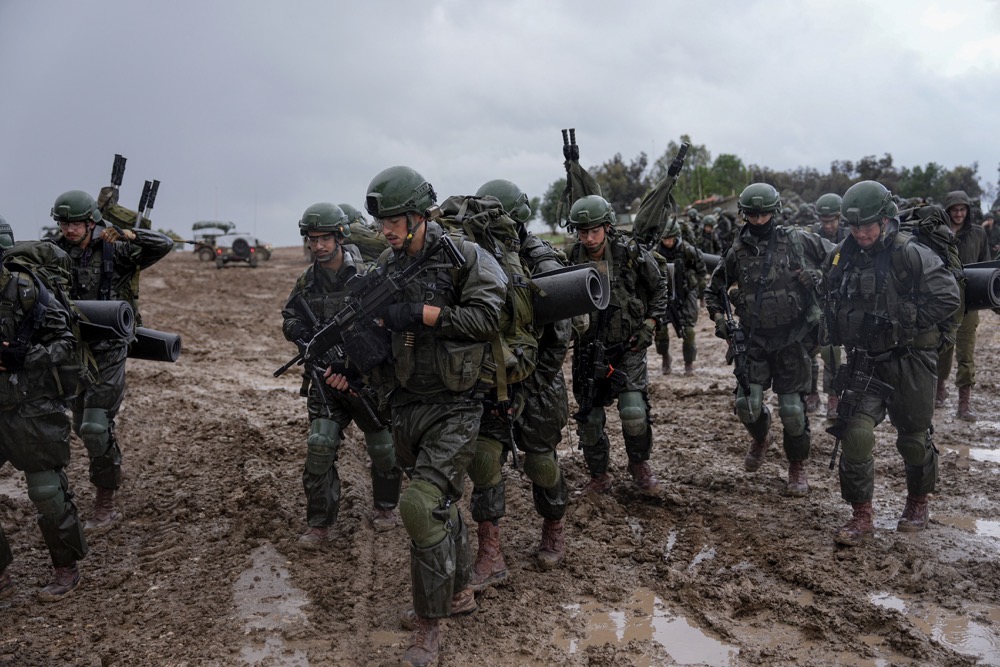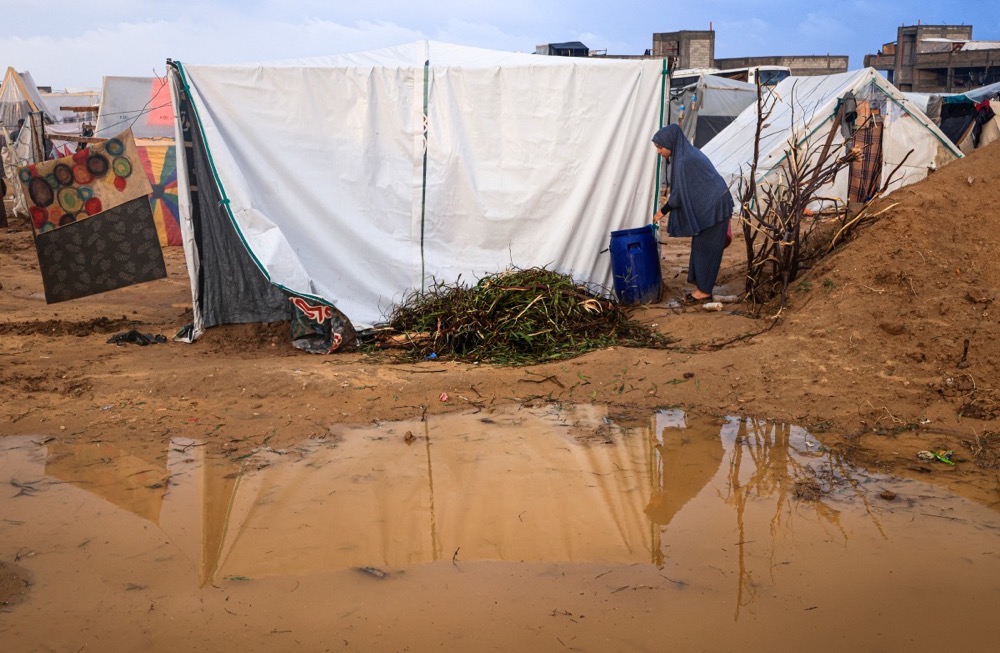LONDON: Strong winds and heavy rains in the Gaza Strip over the past week have compounded the situation for its almost 2 million internally displaced civilians, with concerns mounting over the prospects of a major epidemic being unleashed as a shattered infrastructure struggles to cope.
Even before the more than 60 days of nonstop bombing, experts had been warning that Gaza’s drainage system was no longer fit for purpose. Combined with the destruction, the heavy downpours have seen large swathes of the Palestinian enclave beset by flooding.
Describing the situation as “beyond horrible,” one source told Arab News it was “all true,” that the scale of destruction wrought had shattered the beleaguered territory’s barely coping sewerage infrastructure.
For those living in the hastily erected internal refugee camp at Rafah in the south of Gaza, the combination of wind and rain had left many even more exposed than they had been as flimsy tents found themselves flooded and torn.
Speaking to Reuters news agency as he sought to repair the family’s meager protection from the elements, one displaced Palestinian, Ramadan Mohadad, said their shelter, fashioned from plywood and plastic sheeting, was “torn and water poured on us.”

A Palestinian drags bricks at a camp for displaced people in Rafah. (AFP)
He added: “We tried as much as we could to protect ourselves so water would not get in, but the rain got through ... this plastic does nothing to protect people sleeping under it.”
The situation for Mohadad’s family is anything but an exception.
The war broke out on Oct. 7 with an attack by Hamas militants on southern Israel which, according to Israeli officials, resulted in the deaths of about 1,200 people, mostly civilians, and the taking of nearly 240 hostages, some of whom were released during a brief truce.
As of Sunday, the retaliatory military offensive by Israel had killed more than 18,700 Palestinians and injured another 50,000, according to health officials in the Hamas-run territory.
As the fighting between the Israel Defense Forces and Hamas intensified in October, many Palestinians fled their homes in just the clothes they were wearing, at a time when temperatures were considerably warmer.
With the conflict now in its third month, some of them told AFP news agency they were surviving without mattresses, blankets, or anything else to keep them warm.

Israeli soldiers prepare to enter the Gaza Strip, at a staging area near the Israeli-Gaza border. (AP)
On Sunday, video emerged of crowds boarding and chasing aid trucks as they entered Gaza amid an increasingly desperate situation for trapped civilians.
Seeking to emphasize the level of suffering, the UN Relief and Works Agency shared a video on X in which the mother of a two-year-old sharing a tent with 24 others said their makeshift shelter did nothing to protect her son from the rain.
“He is short of breath; his chest is strained. There’s no blanket to cover him. Qamar, my niece, is one-and-a-half years old. She’s also sick. There is no medicine or treatment, and because of the cold weather she is also short of breath,” the woman added.
“We are suffering. We are 24 persons in this tent. We are cold and we have children … Rain is drenching us and there is no cover, or anything to protect us. Last night, water came inside, drowning us. We are keeping the children on the steps.”
Fikr Shalltoot, Gaza director for charity Medical Aid for Palestinians, told Arab News that along with the “severe shortages” of basic shelter materials, namely tents, tarpaulin, and plastic sheeting, the rain had affected the ability of Gaza’s displaced to eat.
“Due to the lack of cooking gas, people are using wood to cook, but with the rain this is becoming impossible for many families,” Shalltoot said.
A resident of Gaza, she had been in Egypt on Oct. 7 and has not been allowed to return.

Palestinian children play amidst the rain at camp for displaced people in Rafah. (AFP)
Of greater long-term concern though was the issue of waste disposal. The UN Office for the Coordination of Humanitarian Affairs said sewage had been rendered “unmanageable” in the face of three simultaneous challenges: overcrowding in sites designated by Israel as safe for civilians; damage to pipelines; and flooding.
That led OCHA’s humanitarian partners to issue urgent calls for construction materials to be allowed in, with the UN body warning an “inability to provide repairs could result in water being cut off from certain areas in the south of Gaza.”
Further reduction in water supplies is the last thing Gaza wants, with the UN Children’s Fund reporting in November that damaged infrastructure, fuel shortages, and restrictions on aid movements had left supplies at just 5 percent of their pre-war levels.
Nor should Gaza expect any imminent let-up, with temperatures set to fall to as low as 10 degrees Celsius in December, and potentially falling lower still in January, while its rainy season will likely persist well into February.
And that rainy season could be worse than normal, with weather stations close to the southern Gaza-Israel border having already recorded almost twice the average rainfall, heightening worries of flash flooding contaminating what little drinking water remains.
Aid agencies Arab News spoke to, including the International Federation of Red Cross and Red Crescent Societies, said they had been left “concerned that the heavy rain and flooding that is affecting large parts of Gaza is further adding to the risk of waterborne diseases.”
Following the storms, Gaza’s health authorities had documented roughly 360,000 cases of infectious diseases in shelters, but the UN has since warned that the actual number could be much higher.
Shalltoot noted that MAP officials had reported infectious diseases to be “spreading rapidly” through the “overcrowded shelters,” echoing concerns of flash flooding presenting an “alarming risk” to human life.

She said: “Of the 360,000 cases reported, these include respiratory infections, diarrhea, scabies, and skin diseases. Children are suffering from gastroenteritis with diarrhea, and cases of both hepatitis and meningitis have been reported as well.”
Julia Roknifard, an assistant professor at the University of Nottingham’s School of Politics, History, and International Relations, said: “It’s also the issue that people have a very weakened immunity now, which is going to aggravate everything.”
Having on Dec. 12 made his third visit to Gaza since the war began, Commissioner-General of UNRWA Philippe Lazzarini said: “Every time I go back, I think it cannot get worse, but every time I witness more misery.
“What has changed compared to my last visit is that while before we had overcrowded shelters with more than 1 million people living in UN premises, on this trip when I visited a warehouse that became a shelter, we had tens of thousands of people outside.
INNUMBERS
• 1.2m Refugees in Gaza who access UNRWA food aid.
• 1.9m Refugees in Gaza who use UNRWA health services.
“The lucky ones are those who have a place inside our premises, especially now that winter has started. But the others have absolutely nowhere to go, they live in the open, they live in the cold, in the mud, and under the rain.”
And many thousands have yet to make it to the marginally safer parts of Gaza, with videos being shared on social media of a sodden young Palestinian carrying a small body wrapped in a shroud through streets flooded with knee-high waters.
The high waters have all but shut off some of the easier routes south. One Gaza resident told reporters that the already treacherous journey to refugee camps had only been made even harder, an issue also affecting those working for the enclave’s emergency services.

A Palestinian woman gets water outside her makeshift shelter at a camp for displaced people in Rafah. (AFP)
Beside the Egypt border, Rafah has become a vast camp for the displaced, with hundreds of tents erected using wood and plastic sheets.
“We spent five days outdoors. And now the rain has flooded the tents,” Bilal Al-Qassas, a displaced resident, told AFP.
New fears are also gripping many of those that have reached camps in Rafah that Israel’s intention is to simply keep expanding the war until the fighting has engulfed the entire Gaza Strip.
Inas, a 38-year-old mother of five, told Reuters she had been forced to flee four times since Oct. 7.
Now she said she was “terrified of the possibility of displacement to Egypt. That is our worst nightmare. Are they going to expand the ground war to Rafah? If that happens, where should we go? To the sea or to Sinai?”
Similarly, Yasmin Mhani told Reuters, as she hung wet clothes to dry on the tent shelter, that having lost a child after an Israeli bomb struck their house and since moving five times, she was now sharing a single blanket among her remaining five family members.














